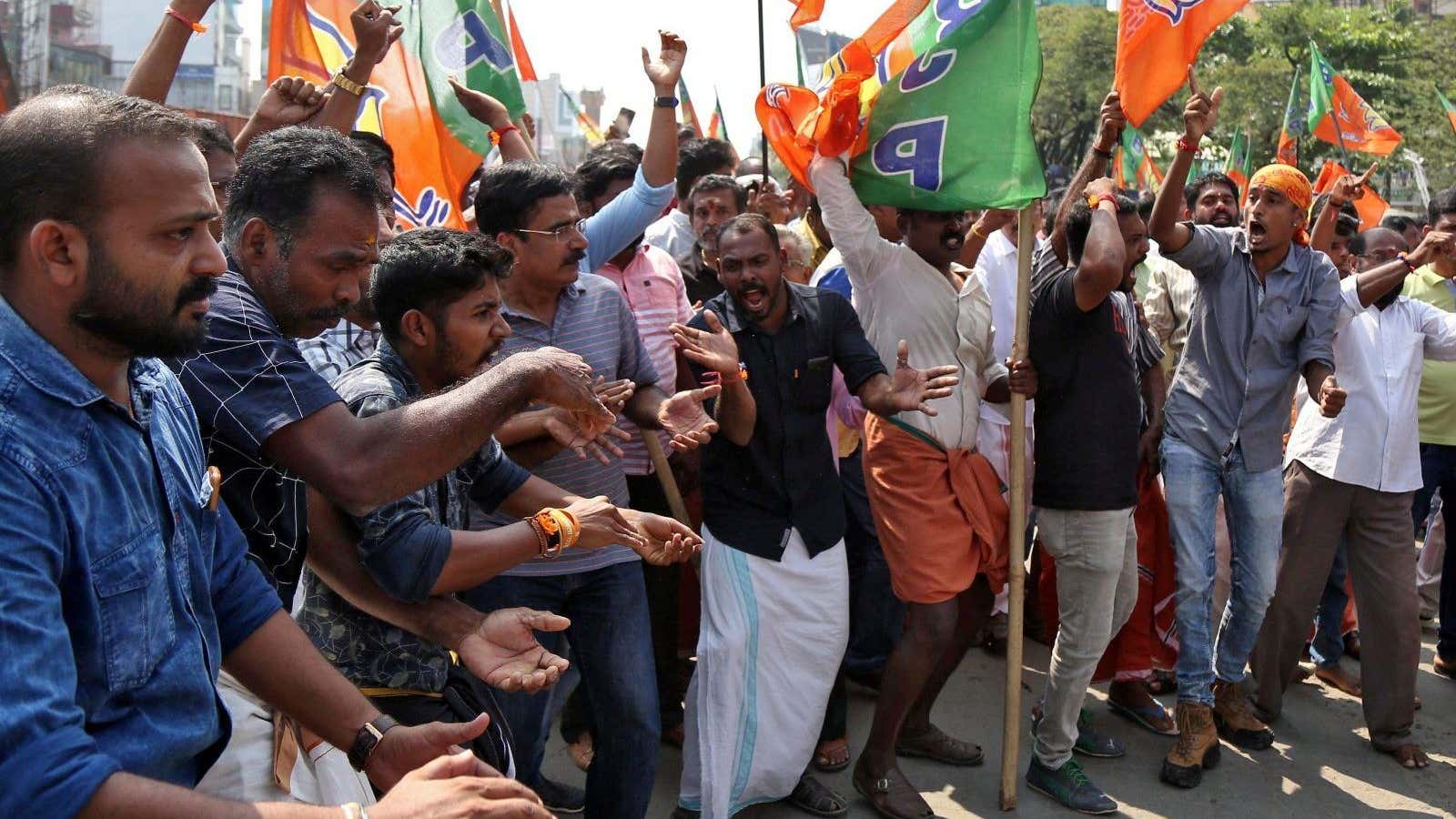A week before it votes in the national elections, India’s last communist bastion seems consumed by religion.
Strange as it may sound, the southern coastal state, known for its high social development indices and political awareness, is hardly debating the usual favourite subjects: demography, unemployment, and environment. Almost every discussion veers around Sabarimala, a temple nestled in the hills of Pathanamthitta, in south Kerala.
This is despite an order by the Election Commission of India (ECI) banning political parties from invoking the recent controversies surrounding the shrine in their campaigns.
Revered among Malayalees (speakers of the native tongue, Malayalam) and a considerable number of Indians living in the southern part of the country, this abode of the Hindu god Ayyappa came under the spotlight in September 2018 when the Indian supreme court overturned an age-old tradition barring women of menstruating age from the temple.
While the responsibility of implementing the supreme court ruling fell on the state government, run by the communist-led Left Democratic Front (LDF), the main opposition, the Indian National Congress-led United Democratic Front (UDF), chose to seek a judicial review.
However, it is a third party that has till now made the most of the ensuing political volatility.
Sabarimala has played the perfect vehicle for the strengthening of prime minister Narendra Modi’s Bharatiya Janata Party (BJP), which till now has had no representation from the state. Kerala has been ruled alternatively for decades by the LDF and UDF.
The BJP in Kerala
Kerala had erupted in protest in the wake of the Sabarimala judgment, leaving a trail of violence. It is keeping in mind this volatility that the ECI barred the “citing or invoking” of the issue. In any case, the use of religious subjects to woo voters is barred according to the poll panel’s model code of conduct, a set of rules that political parties and workers must observe during the electoral process.
The BJP, though, is unwilling to lie low.
“Why shouldn’t we raise the issue? Moreover, the poll officer can only issue suggestions and it is not exactly a diktat,” Madhavan Sarojini Kumar, the state spokesperson of the BJP, told Quartz. “We are doing it only because people want us to.”
K Surendran, a BJP leader contesting elections this year from the Pathanamthitta constituency, has had around 250 cases slapped against him in the wake of the Sabarimala ruling. The party’s state president, PS Sreedharan Pillai, even termed the issue “a golden opportunity,” a statement for which he was booked by the police.
However, what the BJP is up against are two formidable alliances.
“Sabarimala is not such a big issue but it is the only plank on which the BJP is trying to fight elections and is trying to swing the votes away from the ruling LDF,” said Sebastian Paul, a former Left-backed parliamentarian from Kerala.
The Left, led by chief minister Pinarayi Vijayan, rules Kerala, and hopes to offer a counter to the BJP’s Hindu religious plank and the UDF’s factionalism.
The Congress-led alliance’s stand, on the other hand, is a little ambivalent.
“We don’t want to be raising this issue, but since the BJP is, and the Left parties are also defending themselves, we cannot come across as ignoring the Hindu population and their sentiments. We have to talk about it,” said a senior UDF leader.
Why Kerala is key
Traditionally, religion has rarely played a role in the politics of the state, which prides itself over achievements in areas such as education, gender ratio, social equality, and law and order. Kerala has consistently been ranked among the top for its social development indices, irrespective of which political outfit holds the reins. Even following the catastrophic floods of 2018, the state stood apart for the way the disaster was handled by the state machinery and the civil society.
Of its 31.8 million people, 55% are Hindus, 27% Muslims, and around 18% Christians. Yet, the state has rarely witnessed religious polarisation or consolidation politically. Sabarimala, though, could change all that.
While it is a lightweight compared to other large states when it comes to the number of members of parliament it elects, Kerala’s 20 national lawmakers could be key if neither of the national alliances clinches a majority in the election.
As Kerala heads for the polls on April 23, the political fabric of the state is at stake.
Read Quartz’s coverage of the 2019 Indian general election here.
